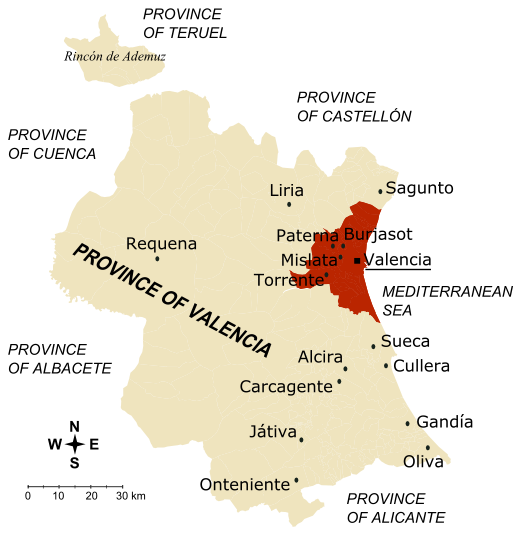|
Blaverism
Blaverism ( ca-valencia, blaverisme, ) is a Spanish nationalist and Valencian regionalist ideology in the Valencian Community (Spain) that emerged with the Spanish transition to democracy characterised by strong anti-Catalanism, born out of its opposition to Joan Fuster's book ''Nosaltres, els valencians'' (1962), which promoted the concept of the ''Catalan Countries'' which includes Valencia. They consider Fuster's ideas as an imperialist Catalan nationalist movement that tries to impose Catalan domination upon Valencia. Blaverism takes its name from the blue ( ca-valencia, blava, link=no) fringe which distinguishes the Valencian flag from other flags with a common origin, particularly from the Catalan. The term "blaverism" originally had a negative connotation, often pejorative connotation still kept among the social groups who consider the blaverism a type of far-right movement. Nowadays, the term '' blaver'' is recognised by different Valencian language dictionaries, includin ... [...More Info...] [...Related Items...] OR: [Wikipedia] [Google] [Baidu] |
Valencian Regionalism
Valencian regionalism is a cultural and political movement that advocates the revival of the identity (language, history, traditions and other distinctive features) of the region now within the Valencian Community in eastern Spain. Politically, the Regionalism (politics), regionalists support the administrative decentralisation of the Spanish state and, for some, the recognition of Valencian Fuero, foral law and increased Political autonomy, autonomy for the Valencian Community. The movement emerged during the early years of the Restoration (Spain), Bourbon restoration in the last third of the 19th century. It took political shape during the early 20th century, and persisted in a controlled and attenuated form through the Francoist Spain, Francoist State. After the restoration of democracy, the regionalist tendency was challenged by a Valencian nationalism with some left-wing and Pancatalanism, pan-Catalanist associations. Regionalism took on a right-wing and anti-Catalanism, anti-C ... [...More Info...] [...Related Items...] OR: [Wikipedia] [Google] [Baidu] |
Catalan Countries
The Catalan Countries ( ca, països catalans, , ) refers to those territories where the Catalan language is spoken. They include the Spanish regions of Catalonia, the Balearic Islands, Valencian Community, Valencia, and parts of Aragon (''La Franja'') and Region of Murcia, Murcia (Carche), as well as the Andorra, Principality of Andorra, the department of Pyrénées-Orientales (aka Northern Catalonia, including Cerdanya, Cerdagne, Roussillon, and Vallespir) in France, and the city of Alghero in Sardinia (Italy). In the context of Catalan nationalism, the term is sometimes used in a more restricted way to refer to just Catalonia, Valencia and the Balearic Islands. The Catalan Countries do not correspond to any present or past political or administrative unit, though most of the area belonged to the Crown of Aragon in the Middle Ages. Parts of Valencia (Spanish) and Catalonia (Occitan language, Occitan) are not Catalan-speaking. The "Catalan Countries" have been at the centre of ... [...More Info...] [...Related Items...] OR: [Wikipedia] [Google] [Baidu] |
Manuel Broseta
Manuel Broseta Pont (13 October 1932 – 15 February 1992) was a Spanish academic and politician. He was a member of the Senate of Spain between 1979 and 1982 and he served as State Secretary for Autonomous Communities for the Union of the Democratic Centre (UCD) between 1980 and 1982. He was also a member of the Spanish Council of State. Broseta was assassinated by ETA members on 15 February 1992. Early life Broseta was born in Banyeres de Mariola in the Province of Alicante. He however moved to the city of Valencia at an early age and went to school there. His father, a member of the Republican Left was temporarily arrested when Spanish leader Francisco Franco visited Valencia. The incident had a lasting impact on Broseta, which made him value freedom and respect for others throughout the rest of his life. In 1955 he obtained his licentiate in Law from the Universidad Literaria de Valencia. He furthered his academic studies at the Complutense University of Madrid, starting ... [...More Info...] [...Related Items...] OR: [Wikipedia] [Google] [Baidu] |
Valencian Language
Valencian () or Valencian language () is the official, historical and traditional name used in the Valencian Community (Spain), and unofficially in the El Carche comarca in Murcia (Spain), to refer to the Romance language also known as Catalan.«Otra sentencia equipara valenciano y catalán en las oposiciones, y ya van 13.» ''20 minutos'', 7 January 2008.Decreto 84/2008, de 6 de junio, ... [...More Info...] [...Related Items...] OR: [Wikipedia] [Google] [Baidu] |
Valencian Community
The Valencian Community ( ca-valencia, Comunitat Valenciana, es, Comunidad Valenciana) is an autonomous community of Spain. It is the fourth most populous Spanish autonomous community after Andalusia, Catalonia and the Community of Madrid with more than five million inhabitants.Instituto Nacional de Estadística, Madrid, 2020. Its homonymous capital Valencia is the third largest city and metropolitan area in Spain. It is located along the Mediterranean coast on the east side of the Iberian Peninsula. It borders with Catalonia to the north, Aragon and Castilla–La Mancha to the west, and Murcia to the south, and the Balearic Islands are to its east. The Valencian Community consists of three provinces which are Castellón, Valencia and Alicante. According to Valencia's Statute of Autonomy, the Valencian people are a ''nationality''. Their origins date back to the 1238 Aragonese conquest of the Taifa of Valencia. The newly-founded Kingdom of Valencia enjoyed its own legal entit ... [...More Info...] [...Related Items...] OR: [Wikipedia] [Google] [Baidu] |
Spain
, image_flag = Bandera de España.svg , image_coat = Escudo de España (mazonado).svg , national_motto = ''Plus ultra'' (Latin)(English: "Further Beyond") , national_anthem = (English: "Royal March") , image_map = , map_caption = , image_map2 = , capital = Madrid , coordinates = , largest_city = Madrid , languages_type = Official language , languages = Spanish language, Spanish , ethnic_groups = , ethnic_groups_year = , ethnic_groups_ref = , religion = , religion_ref = , religion_year = 2020 , demonym = , government_type = Unitary state, Unitary Parliamentary system, parliamentary constitutional monarchy , leader_title1 = Monarchy of Spain, Monarch , leader_name1 = Felipe VI , leader_title2 = Prime Minister of Spain ... [...More Info...] [...Related Items...] OR: [Wikipedia] [Google] [Baidu] |
Populism
Populism refers to a range of political stances that emphasize the idea of "the people" and often juxtapose this group against " the elite". It is frequently associated with anti-establishment and anti-political sentiment. The term developed in the late 19th century and has been applied to various politicians, parties and movements since that time, often as a pejorative. Within political science and other social sciences, several different definitions of populism have been employed, with some scholars proposing that the term be rejected altogether. A common framework for interpreting populism is known as the ideational approach: this defines ''populism'' as an ideology which presents "the people" as a morally good force and contrasts them against "the elite", who are portrayed as corrupt and self-serving. Populists differ in how "the people" are defined, but it can be based along class, ethnic, or national lines. Populists typically present "the elite" as comprising the po ... [...More Info...] [...Related Items...] OR: [Wikipedia] [Google] [Baidu] |
Province Of Valencia
Valencia ( ca-valencia, València) is a province of Spain, in the central part of the autonomous Valencian Community. Of the province's over 2.5 million people (2018), one-third live in the capital, Valencia, which is also the capital of the autonomous community and the 3rd biggest city in Spain, with a metropolitan area of 2,522,383 people it is also one of the most populated cities of Southern Europe.http://appsso.eurostat.ec.europa.eu/nui/show.do?dataset=met_pjanaggr3&lang=en There are 265 municipalities in the province. History Although the Spanish Constitution of 1812 loosely created the province of València, a stable administrative entity does not arise until the territorial division of Spain in 1833, remaining today without major changes. The Provincial Council of Valencia dates from that period. After the Valencian Statute of Autonomy of 1982, the province became part of the Valencian Community. Valencian and Spanish are the official languages. Geography It is borde ... [...More Info...] [...Related Items...] OR: [Wikipedia] [Google] [Baidu] |
Emilio Attard
Emilio Attard Alonso ( Valencia, Spain, 8 April 1915 – Rocafort, 16 December 1997) was a Spanish politician. Attard originally became politically active in his youth during the Second Spanish Republic.Dictionary of Valencian politicians In this period he worked as a lawyer and a legal adviser to the Bank of Spain in Valencia.Obituary, El Pais, 17 December 1997 /ref> He also studied journalism in the early 1930s, writing numerous articles, [...More Info...] [...Related Items...] OR: [Wikipedia] [Google] [Baidu] |
Alicante (province)
Alicante ( ca-valencia, Alacant) is a province of eastern Spain, in the southern part of the Valencian Community. It is the second most populated Valencian province. Likewise, the second and third biggest cities in the Valencian Community (Alicante and Elche, respectively) are located in this province. Alicante is bordered by the provinces of Murcia on the southwest, Albacete on the west, Valencia on the north, and the Mediterranean Sea on the east. The province is named after its capital, the city of Alicante. Territory, population and resources According to the 2018 population data, Alicante ranks as the fourth most populous province in Spain (after Madrid, Barcelona and Valencia), with 1,838,819 inhabitants. Cities with more than 50,000 inhabitants in the province are Alicante (334,757 inhabitants), Elche (230,112), Torrevieja (101,792), Orihuela (86,164), Benidorm (71,034), Alcoy (61,552), Elda (55,168), and San Vicente del Raspeig (53,126). [...More Info...] [...Related Items...] OR: [Wikipedia] [Google] [Baidu] |
Valencia (province)
Valencia ( ca-valencia, València) is a province of Spain, in the central part of the autonomous Valencian Community. Of the province's over 2.5 million people (2018), one-third live in the capital, Valencia, which is also the capital of the autonomous community and the 3rd biggest city in Spain, with a metropolitan area of 2,522,383 people it is also one of the most populated cities of Southern Europe.http://appsso.eurostat.ec.europa.eu/nui/show.do?dataset=met_pjanaggr3&lang=en There are 265 municipalities in the province. History Although the Spanish Constitution of 1812 loosely created the province of València, a stable administrative entity does not arise until the territorial division of Spain in 1833, remaining today without major changes. The Provincial Council of Valencia dates from that period. After the Valencian Statute of Autonomy of 1982, the province became part of the Valencian Community. Valencian and Spanish are the official languages. Geography It is borde ... [...More Info...] [...Related Items...] OR: [Wikipedia] [Google] [Baidu] |
Adolfo Suárez
Adolfo Suárez González, 1st Duke of Suárez (; 25 September 1932 – 23 March 2014) was a Spanish lawyer and politician. Suárez was Spain's first democratically elected prime minister since the Second Spanish Republic and a key figure in the country's transition to democracy after the dictatorship of Francisco Franco. When Spain was still an autocratic regime, he was appointed prime minister by King Juan Carlos in 1976, hoping that his government could bring about democracy. At the time of his appointment, he was not a well-known figure, making many political forces skeptical of his government. However, he oversaw the end of the Francoist Cortes, and the legalisation of all political parties (including the Communist Party, a particularly difficult move). He led the Union of the Democratic Centre and won the 1977 general election. In 1981, he resigned and founded the party Democratic and Social Centre (CDS), which was elected to the Cortes numerous times. He retired from ... [...More Info...] [...Related Items...] OR: [Wikipedia] [Google] [Baidu] |




.jpeg)
